【通用版】小升初英语复习:词汇-考点解读英语专项训练-介词
- 格式:doc
- 大小:41.02 KB
- 文档页数:3
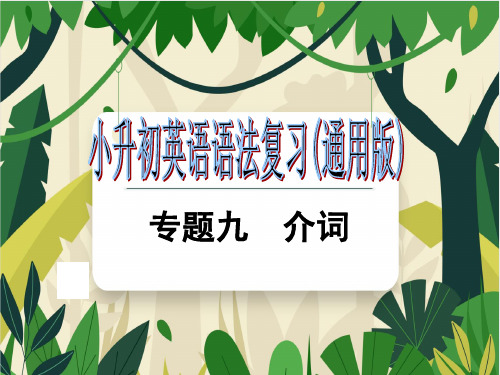

![小升初英语]小升初英语专项训练 介词 通用版(含答案解析)](https://img.taocdn.com/s1/m/c09a47edd05abe23482fb4daa58da0116c171f1e.png)
小升初英语]小升初英语专项训练介词通用版(含答案解析)1.I read books on the weekend.2.It's on April 5th this year.3.New York is in the east of America.4.She goes to work by car.5.XXX.6.I went to the zoo by bus XXX.7.My father is going to work there for a month.8.XXX.9.I've got two XXX.10.-Is your birthday in May。
-No。
it's on the 15th of June.11.It's time to sleep。
Please turn off the light.12.I'll go swimming on XXX.13.Can you fly like a bird?14.Mr。
Wood is on the playground.15.- Where is the science museum。
- It's next to the cinema.16.The dog is under the boat.17.- Where are the fruits。
please。
- They're on Shelf A.18.It rained all day on 12th April.19.I can write XXX.20.Let's throw the bottle into the sea.21.True.22.True.23.False。
It should be "The apple is on the table."24.False。
It should be "I see a mouse on the plate in the kitchen."25.True.26.① In spring② Fly a kite③ In summer④ Go swimming27.Bobby usually rides his bike to school。
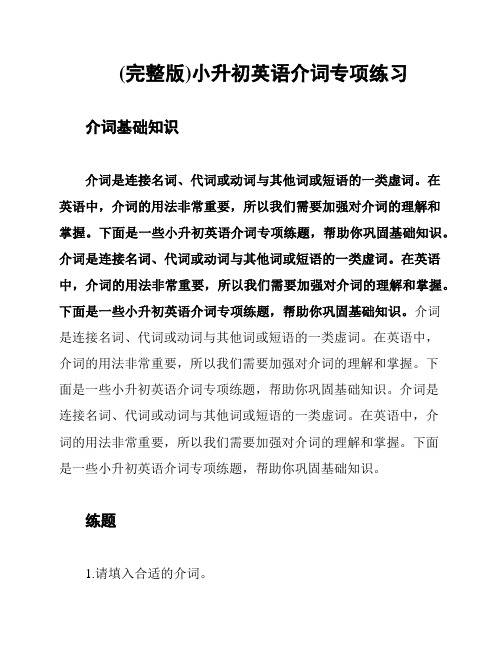
(完整版)小升初英语介词专项练习介词基础知识介词是连接名词、代词或动词与其他词或短语的一类虚词。
在英语中,介词的用法非常重要,所以我们需要加强对介词的理解和掌握。
下面是一些小升初英语介词专项练题,帮助你巩固基础知识。
介词是连接名词、代词或动词与其他词或短语的一类虚词。
在英语中,介词的用法非常重要,所以我们需要加强对介词的理解和掌握。
下面是一些小升初英语介词专项练题,帮助你巩固基础知识。
介词是连接名词、代词或动词与其他词或短语的一类虚词。
在英语中,介词的用法非常重要,所以我们需要加强对介词的理解和掌握。
下面是一些小升初英语介词专项练题,帮助你巩固基础知识。
介词是连接名词、代词或动词与其他词或短语的一类虚词。
在英语中,介词的用法非常重要,所以我们需要加强对介词的理解和掌握。
下面是一些小升初英语介词专项练题,帮助你巩固基础知识。
练题1.请填入合适的介词。
- I'm looking forward ___________ ___ party.- We walked _________ ___.2.根据句意选择合适的介词:- I usually go to school ________ foot.- The dog is hiding ________ the table.3.请将下列句子中的错误部分改正:- My sister is good ___。
She always wins __ in __ her team.4.根据图片选择合适的介词填空:- The cat is ____________ the box.- The bird is ___________ the tree.5.根据句意从方框中选择合适的介词填空(方框中有多余选项):- There is a beautiful garden ________ the house.- The book is ________ the shelf.方框选项:on。

介词一.定义。
介词是英语中很活跃的词,一般置于名词之前。
它常和名词或名词性词语构成介词短语。
同一个介词常和不同的词语搭配形成固定搭配,表示不同意义。
二.分类介词按结构大致分为以下三类:1.简单介词( Simple Prepositions)如:about,at,by,under,of,over..2.符合介词( Compound Prepositions)如:inside,into,outside,without3.短语介词( Phrasal Prepositions)如:in front of,because of,according to,三.用法at①表示时刻: I go to school at seven every day我每天早上7点去上学。
②表示在某一具体地点(小地点): He is standing at the bus stop他站在公共汽车站。
③表示动作的方向、目标:Let me have a look at the picture让我看看这幅图。
④用于某些固定搭配: at once立刻、马上at last 最后at the same time同时at first 开始时not at all一点也不about①表示大约时间: It ’s about six o'clock now.现在大约 6 点钟了。
②表示地点;在周围:Everything about me is so beautiful我周围的一切都那么美好。
③关于,对于: We are talking about the news.我们正在谈论新闻。
④用于某些固定搭配:talk about谈论think about 考虑what/how about怎么样after①在之后:After dinner I watch TV.晚饭后我看电视。
②在后面:He came into the room after me.他在我后面进了房间。
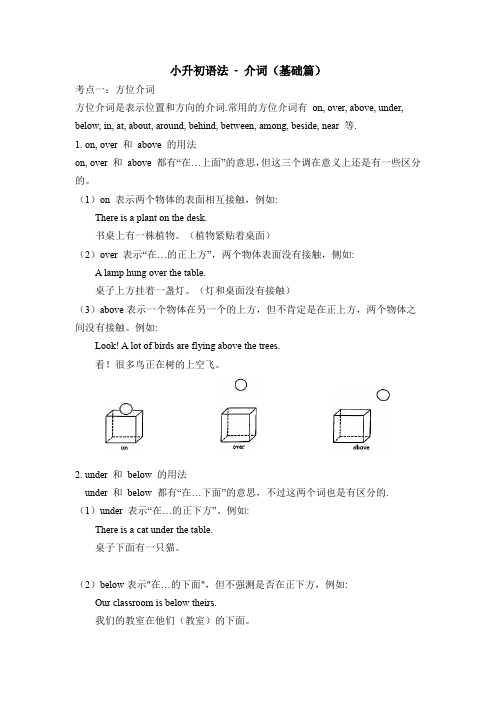
小升初语法-介词(基础篇)考点一:方位介词方位介词是表示位置和方向的介词.常用的方位介词有on, over, above, under, below, in, at, about, around, behind, between, among, beside, near 等.1. on, over 和above 的用法on, over 和above 都有“在…上面”的意思,但这三个调在意义上还是有一些区分的。
(1)on 表示两个物体的表面相互接触,例如:There is a plant on the desk.书桌上有一株植物。
(植物紧贴着桌面)(2)over 表示“在…的正上方”,两个物体表面没有接触,侧如:A lamp hung over the table.桌子上方挂着一盏灯。
(灯和桌面没有接触)(3)above表示一个物体在另一个的上方,但不肯定是在正上方,两个物体之间没有接触。
例如:Look! A lot of birds are flying above the trees.看!很多鸟正在树的上空飞。
2. under 和below 的用法under 和below 都有“在…下面”的意思,不过这两个词也是有区分的.(1)under 表示“在…的正下方”。
例如:There is a cat under the table.桌子下面有一只猫。
(2)below表示"在…的下面",但不强测是否在正下方,例如:Our classroom is below theirs.我们的教室在他们(教室)的下面。
3. in的用法in 表示"在…里面",也可以用来表示在一个很大的空间内。
例如:There are some books in the box箱子里有一些书。
4. at, about 和around 的用法at 表示"在…旁边",about 或around 表示"在…四周"。
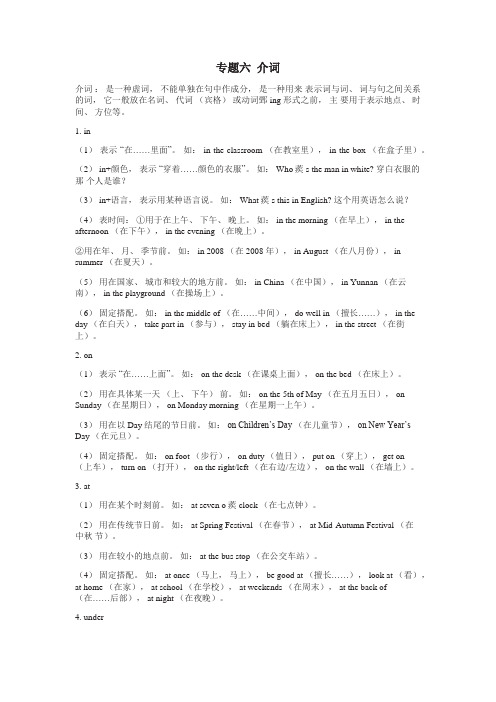
专题六介词介词:是一种虚词,不能单独在句中作成分,是一种用来表示词与词、词与句之间关系的词,它一般放在名词、代词(宾格)或动词鄄ing 形式之前,主要用于表示地点、时间、方位等。
1. in(1)表示“在……里面”。
如: in the classroom (在教室里), in the box (在盒子里)。
(2) in+颜色,表示“穿着……颜色的衣服”。
如: Who蒺s the man in white? 穿白衣服的那个人是谁?(3) in+语言,表示用某种语言说。
如: What蒺s this in English? 这个用英语怎么说?(4)表时间:①用于在上午、下午、晚上。
如: in the morning (在早上), in the afternoon (在下午), in the evening (在晚上)。
②用在年、月、季节前。
如: in 2008 (在 2008 年), in August (在八月份), in summer (在夏天)。
(5)用在国家、城市和较大的地方前。
如: in China (在中国), in Yunnan (在云南), in the playground (在操场上)。
(6)固定搭配。
如: in the middle of (在……中间), do well in (擅长……), in the day (在白天), take part in (参与), stay in bed (躺在床上), in the street (在街上)。
2. on(1)表示“在……上面”。
如: on the desk (在课桌上面), on the bed (在床上)。
(2)用在具体某一天(上、下午)前。
如: on the 5th of May (在五月五日), on Sunday (在星期日), on Monday morning (在星期一上午)。
(3)用在以 Day 结尾的节日前。
如:on Children’s Day (在儿童节),on New Year’s Day (在元旦)。
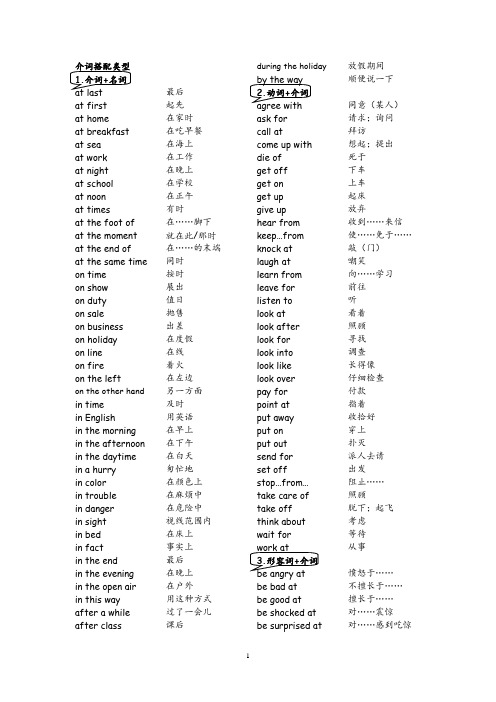
介词搭配类型1.介词+名词at lastat firstat homeat breakfastat seaat workat nightat schoolat noonat timesat the foot of at the moment at the end ofat the same time on timeon showon dutyon saleon businesson holidayon lineon fireon the lefton the other hand in timein Englishin the morning in the afternoon in the daytime in a hurryin colorin troublein dangerin sightin bedin factin the endin the eveningin the open air in this way after a whileafter class最后起先在家时在吃早餐在海上在工作在晚上在学校在正午有时在……脚下就在此/那时在……的末端同时按时展出值日抛售出差在度假在线着火在左边另一方面及时用英语在早上在下午在白天匆忙地在颜色上在麻烦中在危险中视线范围内在床上事实上最后在晚上在户外用这种方式过了一会儿课后during the holidayby the way2.动词+介词agree withask forcall atcome up withdie ofget offget onget upgive uphear fromkeep…fromknock atlaugh atlearn fromleave forlisten tolook atlook afterlook forlook intolook likelook overpay forpoint atput awayput onput outsend forset offstop…from…take care oftake offthink aboutwait forwork at3.形容词+介词be angry atbe bad atbe good atbe shocked at be surprised at 放假期间顺便说一下同意(某人)请求;询问拜访想起;提出死于下车上车起床放弃收到……来信使……免于……敲(门)嘲笑向……学习前往听看着照顾寻找调查长得像仔细检查付款指着收拾好穿上扑灭派人去请出发阻止……照顾脱下;起飞考虑等待从事愤怒于……不擅长于……擅长于……对……震惊对……感到吃惊be careful aboutbe excited aboutbe happy aboutbe sorry aboutbe sure aboutbe worried aboutbe famous forbe fit forbe good forbe hungry forbe late forbe ready forbe thankful forbe far away frombe afraid ofbe careful ofbe free ofbe fond ofbe full ofbe proud ofbe short ofbe sure ofbe tired ofbe dressed inbe rich inbe interested inbe successful inbe weak inbe close tobe kind tobe angry withbe busy withbe patient withbe pleased withbe popular withbe strict with3.A+介词+Aday after dayday by dayyear after yearlittle by littleone by onestep by stepside by side对……小心对……感到兴奋对……高兴对……感到抱歉对……有把握对……感到担心以……出名适合……对……有好处渴望……因……而迟到准备好……因……而感激远离……害怕……小心……免于……喜欢……充满了……以……为骄傲缺少……对……有把握厌倦……穿着……在……丰富对……感兴趣在……成功在……薄弱靠近……对……友好/和善生……的气忙于……对……有耐心对……感到满意受……欢迎对……严厉日复一日一天天地年复一年渐渐地一个接一个地一步步地肩并肩arm in arm hand in handface to faceback to backheart to hearttooth for toothword for word臂挽臂手拉手面对面背靠背坦诚地以牙还牙逐字地。

专项复习讲义小升初语法专题-介词专项复习讲义小升初语法专题介词在我们学习英语的过程中,介词可是一个非常重要的部分。
对于即将面临小升初的同学们来说,掌握好介词的用法,能够让我们的英语表达更加准确和流畅。
今天,咱们就一起来好好复习一下介词吧!首先,咱们来了解一下什么是介词。
介词是一种虚词,它不能单独使用,而是要和名词、代词或者相当于名词的其他词类、短语或从句一起构成介词短语,在句子中充当状语、定语、表语等成分。
比如说,“in the room”(在房间里),“on the table”(在桌子上),这里的“in”和“on”就是介词。
接下来,咱们看看常见的介词都有哪些。
常见的介词有at、in、on、under、behind、near、between、among、with、without、for、of、to、from 等等。
这些介词虽然看起来简单,但是用法可不少呢!先说说“at”,它通常用来表示在某个具体的时间点或者小地点。
比如说,“at six o'clock”(在六点钟),“at the bus stop”(在公交车站)。
“in”呢,一般用来表示在较大的时间范围或者空间范围内。
比如,“in the morning”(在早上),“in the room”(在房间里)。
“on”则常用来表示在具体的某一天或者在某个表面上。
例如,“on Monday”(在星期一),“on the desk”(在桌子上)。
“under”表示在下面,“behind”表示在后面,“near”表示在附近。
比如,“The cat is under the chair”(猫在椅子下面。
)“The tree is behindthe house”(树在房子后面。
)“The park is near my home”(公园在我家附近。
)“between”和“among”都有“在之间”的意思,但“between”通常用于两者之间,而“among”用于三者或三者以上之间。

介词一般置于名词之前。
它常和名词或名词性词语构成介词短语。
一、表达时间旳介词注意:不用介词表达旳词组:this year; this morning; last night; last summer; next Sunday;yesterday; tomorrow如:Did you do your homework last night?I am going to Beijing next Sunday.What are you going to do this afternoon?三、方位介词三、表达地点位置旳介词1. at+小地方:at home; at school; at the bus stop; at the library;2. in+大地方:in China; in Zhaoqing;四、固定搭配1. listen to---听write to----写; look at-----看;Please listen to me. 请听我讲。
I will write to you later. 我晚点会写信给你旳。
Please look at the picture 让看着这幅图。
2. in +科目:in English: What's this in English? 这用英语怎么说?in black clothes 穿黑色衣服3. for +动词ing: Thank you for helping me. 谢谢你帮我。
for+某人:I'll make a card for my teacher. 我要给老师做张卡片。
for+早午晚餐:It’s time for breakfast. =It’s time to have breakfast.4. about1) 大概:It’s about six o'clock now. 目前大概6点钟了。
2) 有关:We are talking about the news. 我们正在谈论新闻。

1.介词,是小升初复习中既基础又重要的知识点,是一个比较细又容易出错的知识点,通常在“单项选择”、“完形填空”“作文”写作题中考进行考察。
2.时间介词,地点介词,介词搭配是小升初英语介词中,考查的重点。
1. 熟记常见时间介词、地点介词的基本用法。
2. 熟记常考的介词短语搭配。
3. 将介词正确运用在作文、完形填空、选择题中。
1.时间介词in, on, at, during.2.地点介词in ,on, at.3.介词后的动词名词/代词/ving形式。
4.常见介词用法。
介词定义:英语介词(preposition 简写prep.,以下简称介词。
)介词是一种虚词,不能单独作句子成分,只能用在一个名词、代词或相当于名词的结构之前,可以与后面的词一起构成介词短语。
小学阶段常见介词:in,on,with,by,for,at,about,under,of,from, to,during,before, after,beside, behind, below, above, into, over,within,up, down。
介词后+名词/代词/Ving形式。
以下就常考介词进一步分析:1.at 用在某一段时刻。
Eg. at dawn/daybreak 在黎明at six (o’clock)在六点at night在夜晚at 4:30在4点30用at 来表示在……岁时at sixteen/at the age of sixteen :16岁的时候I go to school _______seven every day.A. atB. inC. onD. for答案:A2.on主要用在星期几、具体某一天或某一天的早、中、晚或节日前。
Eg. on Mid-Autumn Day 在中秋节on June 1st 在6 月1 日on Christmas Day 在圣诞节那一天,也可用at Christmason New Year's Day在新年那天I usually stay ______home______Saturday.A .at, on B. at, inC. in, atD. in, on答案:A3.in表示一段时间,用于年、月、四季或泛指的一天的上午、下午、晚上等前。

小升初专项语法讲解一:介词介词是表示句子结构中词与词或句子成分之间关系的一种虚词。
介词不能单独作句子成分,它只有跟其后的宾语一起构成介词短语,才能在句中起作用。
一、介词的分类1.简单的介词:通常指一个单词的介词。
如:at,in,by,to,about,between2.合成介词:指由两个单词合在一起所构成的介词。
如:without,upon,into,outside3.短语介词:指由两个或两个以上的单词组合在一起所构成的介词。
如:in front of , because of, instead of, in order to, in spite of二、常用介词用法辨析1.表示时间的介词1)a t,on,in都有“在……时间”的意思,其用法区别是:A.at表示时间“一个具体的点”,或用在固定词组中。
如:at ten o’clock 在十点钟at 9:30 a.m. 在上午9点半at noon 在正午at night 在晚上at the weekend 在周末at Christmas 在圣诞节B.on表示某日或某日的部分,用在具体的时间前面。
on Friday 在星期五on May,1 在5月1日on February,2,1990 在1990年2月2日on New Years’Eve 在除夕on Monday morning 在周一上午on Sunday night 在周日晚上注:在某年某月某日的上午、下午或晚上用介词inin the afternoon of the September,6,1989 在1989年9月6日下午C.in表示一段时间或季节In July 在7月份in 1990 在1990年in winter 在冬天in the autumn of 1988 在1988年的秋天注:in time 表示“及时”,意为“没有晚”。
on time表示“按时”,意为“不早不晚”。
He will be in time for the meeting. 他会及时来看会的。


小升初英语介词专项练习一.选词填空:1.My father usually goes to work ________ (at, in, on) 8:00.2.The party will begin ______ (at, in, on) 2:00pm.3.We never go shopping ______ (at, in, on) the evening.4.I get up at 7:30 _______ (at, in, on) the morning.5.Christmas is __________ (at, in, on) December 25th.6.What is the first lesson(课)________ (at, in, on) Tuesday?7.Mr. Web will go to Shanghai ______ (at, in, on) Oct. 22nd.8.He often plays football with his friends _______ (at, in, on) Sunday.9.Children don’t go to school _______(at, in, on) New Year’s Day.10.What’s this______(at,on,in)English?11.Christmas is______(at,on,in)the 25th of December.12.Look at those birds______ (on,in)the tree.13.Is there a cat______ (under, behind, in)the door?二、选择题:( ) 1. The girl usually practices the piano ____ Saturday morning.A.onB. inC. at( ) 2. .He left home a cold winter evening.A.atB. onC. in( ) 3. Is there a river ______ the house?A.toB. ofC. inD. behind( ) 4. They’re running _______ the playground.A.withB. inC. at( ) 5. Can we eat _______ Guangzhou Restaurant today?A.toB. ofC. at( ) 6. She studies English ______ Rose School ____ England.A.at, fromB. in, inC. at, in( )7 .A plane is flying ____ the city.A.onB. overC. above( )8 .There are many apples ___ the tree. A bird ___ the tree is pickingan apple.A.in onB. on inC. in at( ) 9. It’s time ______ supper.A.atB. inC. onD. for( ) 10. It’s no time ______ school. It’s time ______ go back home.A.to, forB. to, toC. for, to( ) 11. Mr Brown comes ______ America.A.atB. fromC. inD. to( ) 12. What’s this _____ English?A.inB. atC. onD. under( ) 13. Sometimes I go to school _____ foot.A.byB. inC. onD. with( ) 14. Count (数)_____ one _____ ten.A.from, byB. from, toC. to, toD. at, to( ) 15.My sister is looking ____ her new shoes now.A.atB. afterC. forD. to( ) 16. It’s cold outside. Please _____ your warm clothes.A.put inB. take offC. put onD. put up( ) 17. The classroom is quite different _____ that one.A.ofB. fromC. withD. like( ) 18. A: Do many children in our class often skate ________ winter?B: Yes, they usually have fun _______ winter.A.in, inB. on, onC. at, at( ) 19. A: Does the autumn start _________ August?B; Sometimes it does. But usually it starts _______ September.A.in, inB. on, onC. at, at( ) 20. I usually play table tennis ________ school.A.afterB. whenC. by( )21. I like summer. Is it cool autumn? What summer? Oh, it is toohot.A.in, about onB. on, about onC. in, about in( ) 22. A: Do you listen to the radio _______ a long time?B: No, I often listen to it ______________ twenty minutes.A.for, toB. for, forC. to, for( ) 23. When is May Day? It’s _______ the first of May.A.onB. inC. at( ) 24. They will move to the new school ______ next Monday.A.onB. inC. /( ) 25. He always goes to school at 7:00 ______ every day.A.onB. inC. /( ) 26. She does her homework ______ half an hour every day.A.inB. forC. /三、选择填空( )1.___ the afternoon of May, we visited the old man.A.OnB. AtC. In( )2.Many people work ___ the day and sleep ___ night.A.on atB. in inC. in at( )3.He speaks Japanese best ____ the boy students.A.betweenB. withC. among( )4.He left home ___ a cold winter evening.A.atB. onC. in( )5.Shanghai is ____ the east of China.A.inB. onC. to( )6.I really can’t agree ____ you.A.toB. onC. with( )7.The shop won’t open ___ nine in the morning.A.untilB. atC. during( )8.How about ___ the flowers now?A.wateringB. are wateringC. watered( )9.She spent all his money ___ books.A.inB. withC. on( )10.What will you have ___ breakfast this morning?A.withB. forC. by( )11.A plane is flying ____ the city.A.onB. overC. above( )12.Mr. Green will stay in China___ Friday.A.toB. onC. till( )13.It’s wrong to play jokes ___ other people.A.onB. ofC. with( )14.I paid two hundred yuan ___ that kind of bicycle.A.inB. forC. on( )15.I won’t ask about it, I’m going to see it ___ my own eyes.A.byB. forC. with( )16.There is a small river ___ the two townsA.inB. betweenC. among( )17.Are you going to the zoo __ _ bus or ___ my car?A.on byB. by inC. on in( )18. We traveled overnight to Paris and arrived _______ 5 o’clock ______ the morning. A. on; in B. at; in C. at; on D.in; on( )19. Hong Kong is ______ the south of China, and Macao is ______ the west of Hong Kong. A. in; to B. to; to C. to; in D. in;i( )20.There are many apples ___ the tree. A bird ___ the tree is picking an apple. A. in on B. on in C. in at。

小升初英语考前冲刺Part I. 介词专项训练(80题)介词是英语中很活跃的词,每个介词通常都具有多种意思(如in,既是时间介词,又是方位介词,同时还是方式介词),使用频率是很高的,仅次于冠词。
它本身是虚词,在句子中不能承担具体成分,一般放在名词之前。
它常和名词或名词性词语构成介词短语。
一般分为:空间和方位介词、时间介词、方式介词和其他介词。
考点1:空间和方位介词at, in, on, above, over, below, under等。
1.The apple is (在……上面)the desk.2. There is a map (在……上面)the wall.3.The bird is flying (在……正上方)the sea.4.Look, the cat is (在……正下面) the table.5.Write your name (在……下方) the line.6. Our plane flew (在……上方) the clouds.7.The cat is (在……里面)the box.8. She is washing clothes (在)home.9.I live (在) China.10.My teacher is sitting (在……之间)Chen Jie and Wu Yifan.11.There is a house (在……之中)the trees.12.There is a tree (在……前方)the house.13.Mike is sitting (在……前面)the living room.14. There is a tree (在……后面)the house.15. .Please stand (在……旁边)the train.16.There is a bus stop (近的,不远的)the school.17..My grandpa is walking (沿着) the street.18..My grandpa is walking (横过) the street.19.The river was (贯穿,通过)the city.20.There is a monkey (在……上)the tree.21. There are many apples (在……上)the tree.22. Mike went (到达……地点)the park yesterday.23.Jenny and her mother are walking (向;往)the train.24.When do you leave (向;往)China.25. There is a big tree (在……的外面)the house.26. Don`t let the dog come (在……内;向内)the house.27. How far is it (从……地点起)our school to the bank?答案讲解:1. on 在……上面,常表示两个物体有接触面。
小升初英语介词专项练习一.选词填空:1.My father usually goes to work ________ (at, in, on) 8:00.2.The party will begin ______ (at, in, on) 2:00pm.3.We never go shopping ______ (at, in, on) the evening.4.I get up at 7:30 _______ (at, in, on) the morning.5.Christmas is __________ (at, in, on) December 25th.6.What is the first lesson(课)________ (at, in, on) Tuesday?7.Mr. Web will go to Shanghai ______ (at, in, on) Oct. 22nd.8.He often plays football with his friends _______ (at, in, on) Sunday.9.Children don’t go to school _______(at, in, on) New Year’s Day.10.What’s this______(at,on,in)English?11.Christmas is______(at,on,in)the 25th of December.12.Look at those birds______ (on,in)the tree.13.Is there a cat______ (under, behind, in)the door?二、选择题:( ) 1. The girl usually practices the piano ____ Saturday morning.A.onB. inC. at( ) 2. .He left home a cold winter evening.A.atB. onC. in( ) 3. Is there a river ______ the house?A.toB. ofC. inD. behind( ) 4. They’re running _______ the playground.A.withB. inC. at( ) 5. Can we eat _______ Guangzhou Restaurant today?A.toB. ofC. at( ) 6. She studies English ______ Rose School ____ England.A.at, fromB. in, inC. at, in( )7 .A plane is flying ____ the city.A.onB. overC. above( )8 .There are many apples ___ the tree. A bird ___ the tree is pickingan apple.A.in onB. on inC. in at( ) 9. It’s time ______ supper.A.atB. inC. onD. for( ) 10. It’s no time ______ school. It’s time ______ go back home.A.to, forB. to, toC. for, to( ) 11. Mr Brown comes ______ America.A.atB. fromC. inD. to( ) 12. What’s this _____ English?A.inB. atC. onD. under( ) 13. Sometimes I go to school _____ foot.A.byB. inC. onD. with( ) 14. Count (数)_____ one _____ ten.A.from, byB. from, toC. to, toD. at, to( ) 15.My sister is looking ____ her new shoes now.A.atB. afterC. forD. to( ) 16. It’s cold outside. Please _____ your warm clothes.A.put inB. take offC. put onD. put up( ) 17. The classroom is quite different _____ that one.A.ofB. fromC. withD. like( ) 18. A: Do many children in our class often skate ________ winter?B: Yes, they usually have fun _______ winter.A.in, inB. on, onC. at, at( ) 19. A: Does the autumn start _________ August?B; Sometimes it does. But usually it starts _______ September.A.in, inB. on, onC. at, at( ) 20. I usually play table tennis ________ school.A.afterB. whenC. by( )21. I like summer. Is it cool autumn? What summer? Oh, it is toohot.A.in, about onB. on, about onC. in, about in( ) 22. A: Do you listen to the radio _______ a long time?B: No, I often listen to it ______________ twenty minutes.A.for, toB. for, forC. to, for( ) 23. When is May Day? It’s _______ the first of May.A.onB. inC. at( ) 24. They will move to the new school ______ next Monday.A.onB. inC. /( ) 25. He always goes to school at 7:00 ______ every day.A.onB. inC. /( ) 26. She does her homework ______ half an hour every day.A.inB. forC. /三、选择填空( )1.___ the afternoon of May, we visited the old man.A.OnB. AtC. In( )2.Many people work ___ the day and sleep ___ night.A.on atB. in inC. in at( )3.He speaks Japanese best ____ the boy students.A.betweenB. withC. among( )4.He left home ___ a cold winter evening.A.atB. onC. in( )5.Shanghai is ____ the east of China.A.inB. onC. to( )6.I really can’t agree ____ you.A.toB. onC. with( )7.The shop won’t open ___ nine in the morning.A.untilB. atC. during( )8.How about ___ the flowers now?A.wateringB. are wateringC. watered( )9.She spent all his money ___ books.A.inB. withC. on( )10.What will you have ___ breakfast this morning?A.withB. forC. by( )11.A plane is flying ____ the city.A.onB. overC. above( )12.Mr. Green will stay in China___ Friday.A.toB. onC. till( )13.It’s wrong to play jokes ___ other people.A.onB. ofC. with( )14.I paid two hundred yuan ___ that kind of bicycle.A.inB. forC. on( )15.I won’t ask about it, I’m going to see it ___ my own eyes.A.byB. forC. with( )16.There is a small river ___ the two townsA.inB. betweenC. among( )17.Are you going to the zoo __ _ bus or ___ my car?A.on byB. by inC. on in( )18. We traveled overnight to Paris and arrived _______ 5 o’clock ______ the morning. A. on; in B. at; in C. at; on D.in; on( )19. Hong Kong is ______ the south of China, and Macao is ______ the west of Hong Kong. A. in; to B. to; to C. to; in D. in;i( )20.There are many apples ___ the tree. A bird ___ the tree is picking an apple. A. in on B. on in C. in at。